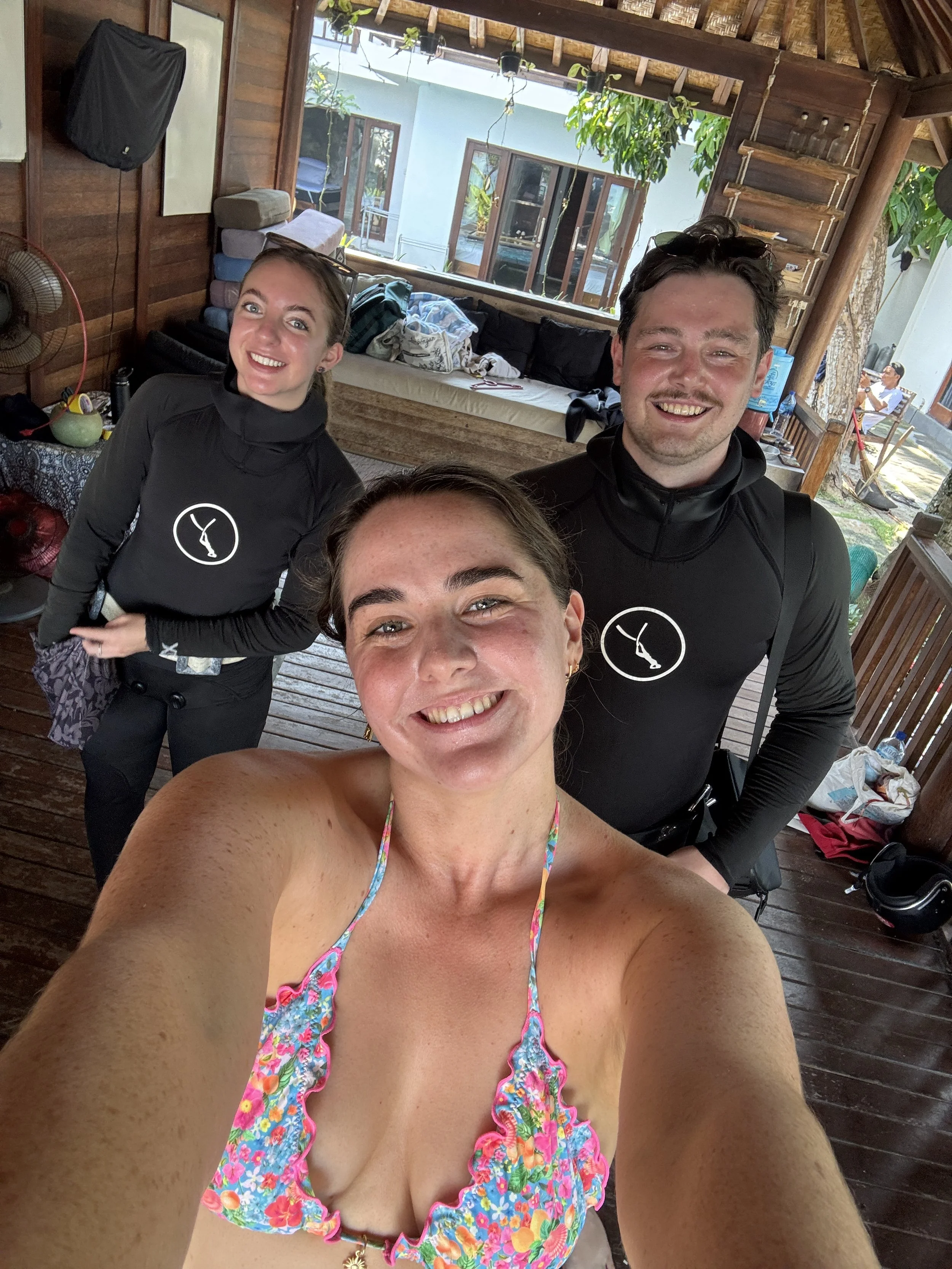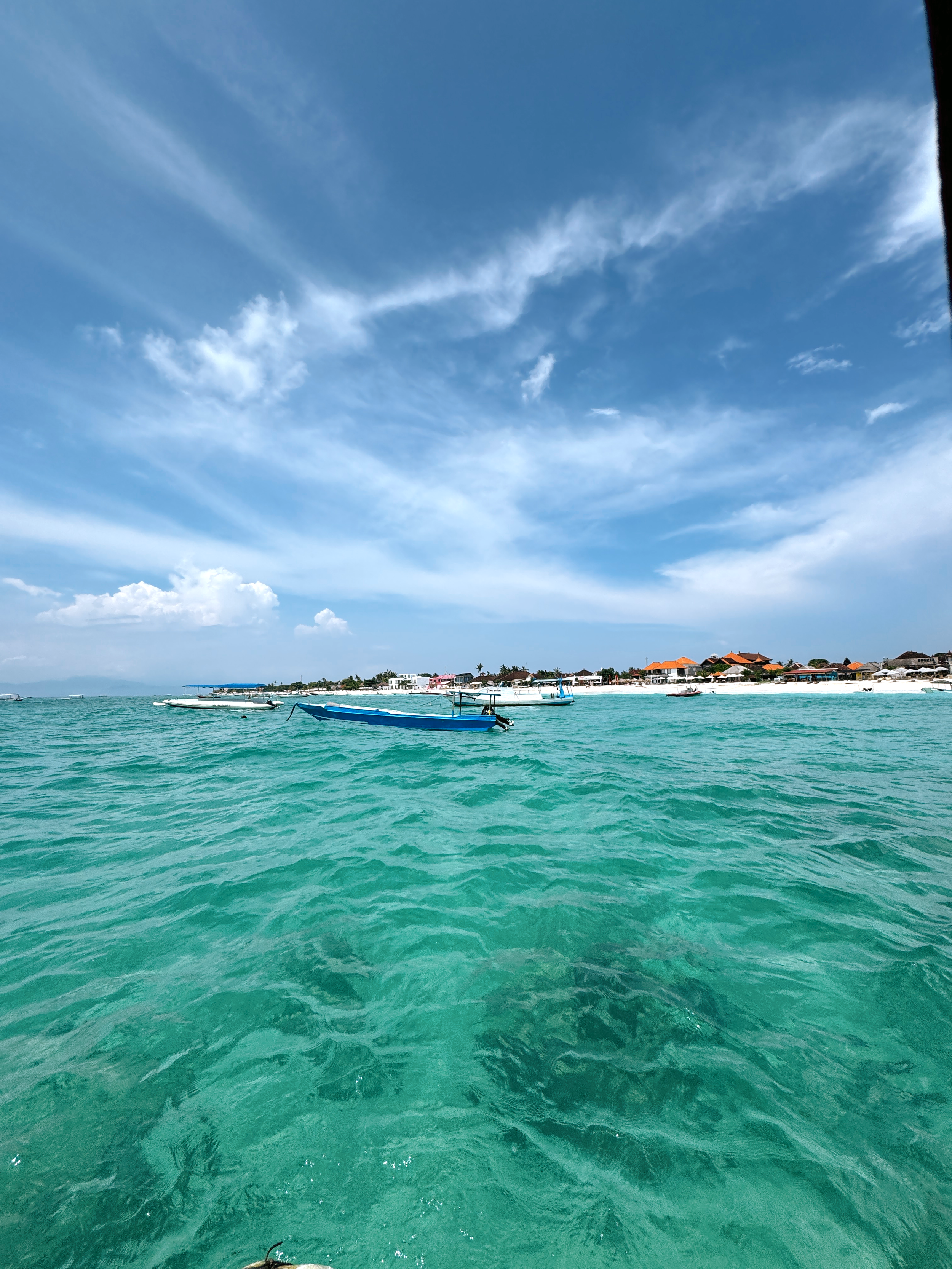Learn to free dive in Bali
In February 2025, we got our PADI freediving accreditation at Fluid Focus Freedive in Nusa Lembongan. Easily one of the highlights of our year, opening our minds to a new form of discipline, a new skillset and mental fortitude that we’ve never encountered! Freediving is more than just a way to challenge your breath hold and spend longer underwater, it’s an art of self control, being comfortable in discomfort and connecting to the moment, here’s how you can learn in Bali!
Contents
Where is the course?
On Bali’s nearby island of Nusa Lembongan, you’ll find Blue Corner Dive centre, hosting the team from Fluid Focus Freedive, with a combined diving experience of over 30 years, the crew here know exactly how to guide first-time free divers through the course, pool sessions and the open water dives! Accessible by a 30-45 minute ferry from Sanur Harbour, Nusa Lembongan is easy to get to and beyond this incredible freediving experience, should be on your Bali itinerary with its golden sand beaches and vibrant coral reefs.
Is it accredited?
Fluid Focus Freedive deliver PADI accredited courses. They provide a range of available courses, from which we choose to complete the Level One Freedive course (beginner friendly) which ran roughly 3 days, with one half day and two full days. Upon completion of the course you’ll receive an official PADI certification recognised by thousands of organisations and dive centres across the globe.
What is the course like?
The course is built with the most important element of freediving front of mind, to be relaxed. The entire team at Fluid Focus Freedive understands the significance of relaxation for the sport of freediving, which bleeds through the entire course from the theoretical to the open ocean practical. The very first activity we did had us placing an oxygen sensor on our fingers and observing just how much oxygen we have in our body when we get the urge to breath!
Day one consisted of basic theory of freediving including why we feel the urge to breathe and how relaxation controls how long we can hold our breath. After a few exercises in reaching a deeply relaxed state, we jumped in the pool for our first attempt at static breath holds, floating face down, still, in the pool. After all the relaxation techniques we learned, everyone in our group easily achieved the static breath hold requirements for the certification. Without much in the way of training, just some techniques for relaxation and stillness, holding your breath comfortably is much easier than we thought!
Day two began with some more theory about how carbon dioxide triggers our urge to breath and how exposure therapy / carbon dioxide tables / breath work can build our tolerance to carbon dioxide in our bodies and help increase our breath hold ability. We jumped in the pool for another set of static breath holds before getting ready for our first open water session!
The main event, equalisation, was introduced, with techniques and theory to help us understand the necessity to equalise thoroughly and frequently. After a short boat ride to our first dive point, we jumped in and dropped the lines for our first warmup free dives in the ocean! We began with free immersion, a freediving technique where you pull yourself down and back up the line without kicking, and while maintaining contact with the line at all times. This is important to get you used to very frequently equalising as you dive. After an hour or so we’d drifted close enough to Nusa Penida’s reef that we could dive down and observe the marine life with our new breath hold and equalisation skills! But this was just a comfortable introduction, the real challenges came on day three.
Day three introduced dynamic apnea, actively swimming lengths of a pool while underwater, and a sinus illness for Erin. This was the first experience we had with having to balance the relaxation and breath hold with kicking and trying to make distance. After several attempts, we learnt some safety skills for buddying divers making dynamic attempts before briefing for our last ocean session. Heading out to the same area as the day prior, the line was dropped to 10m and we began our warm up dives.
A combination of sickness, sinus overuse from it being most of our groups first time equalising at these depths and straight up exhaustion meant equalising became a real challenge and not everyone was able to reach the required dive depth and the subsequent safety skills. Regardless of how everyone performed in the ocean, each of us were still accredited with at least a PADI Basic Freediver certification for the static and dynamic apnea results in the pool as well as the demonstrated understanding of how to participate in the sport safely! A ticket to spending more time underwater, in a single breath, all over the world!
Tips from our experience
The team at Fluid Focus Freedive made the course what it was, and they’re the highlight for why we’d recommend them for you if you’re looking for the clearest, calmest and most fun free diving learning experience in Bali.
Watch some YouTube videos and practice equalising! If you have access to a pool or the ocean is nearby, jump in and practice, practice, practice! Getting this skill in your tool belt before trying to combine it with holding you breath while slipping through the endless blue will make reaching depths much easier.
Put that leave in, sign out of the email account and chill. Freediving is a sport that simultaneously requires incredible focus and single pointed attention, alongside complete and total inner stillness. You’ll be fighting the urge to breath when you turn 10m below the surface and the flickers of sunlight that call for your next breath are further than they’ve ever been, and you might struggle to trust yourself in that situation if you have other things on your mind!
There’s nothing you can do about being sick! The nature of the course means that even if you don’t achieve the requirements, you’ll still learn everything you need to know about the basics of freediving and get real, supervised experience diving down deep. If you fall sick and the sinus’ are not cooperating, don’t push it because it could mean the difference between freediving in a week or freediving in six months. That said, if you begin to fall sick prior to your course I’d advise you try to reschedule as equalisation can become extremely difficult and dangerous for your body.
That’s It!
If you’ve made it down here, thank you so much for reading!
Good luck for your freediving journey - it’s one you won’t regret!








